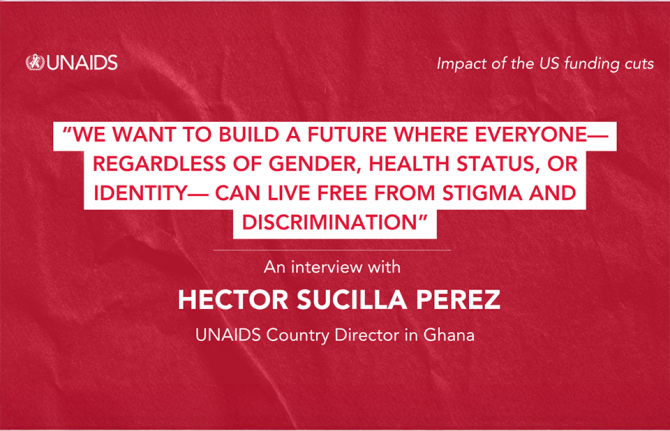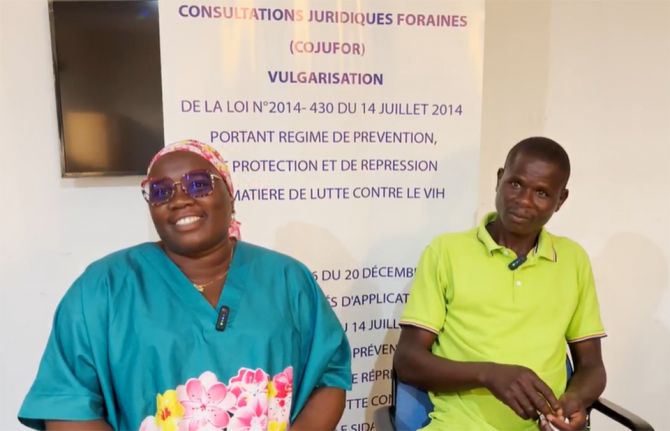



Update
The Rudra Béjart School dances for gender parity
10 March 2016
10 March 2016 10 March 2016Around 40 young dancers from the Rudra Béjart School of Dance performed to celebrate International Women’s Day at a special event at the Hotel Intercontinental in Geneva, Switzerland.
The dancers’ breath-taking choreography illustrated “A pledge for gender parity”, the 2016 International Women’s Day theme. Around 150 people joined special guests Princess Tessy of Luxembourg and the Minister for Health and Public Hygiene of Côte d’Ivoire, Raymonde Goudou Coffie, at the event. Other high-level guests included ambassadors from the Permanent Missions to the United Nations Office of Ghana, Luxembourg, Switzerland and the United States of America, as well as Sweden’s Special Ambassador for HIV.
All proceeds from the event will benefit the International Community of Women Living with HIV in Zimbabwe.
At the beginning of the evening, UNAIDS Executive Director Michel Sidibé expressed his commitment to pushing for the rights, health and empowerment of women and girls at the United Nations General Assembly High-Level Meeting on Ending AIDS, which will take place in New York, United States of America, in June.
The Rudra Béjart School of Dance is a private international free school sponsored by the Sandoz Family Foundation, Béjart Ballet Lausanne, Loterie Romande, the Fondation Leenaards, the Fondation MauriceBéjart and Jaquet Droz.
Quotes
"HIV is not just a medical or health issue. It is an issue of human rights, social justice and gender equality - of achieving parity between the sexes. If we are to reach our goal of ending the AIDS epidemic by 2030, we need to mobilize, advocate and act to change global attitudes and build equality across all communities."
“The Rudra Béjart School of Dance, founded by the great Maurice Béjart in 1992, is an institution which goes far beyond teaching the art of dance and movement. It is founded on the principles of empowerment, fairness and equality, enabling young people to stand up to life’s challenges resolutely and without aggression. After three years of partnering with UNAIDS, I understand that these same values of rights, justice, fairness, empowerment and gender equality are imperative to the HIV response.”
“This event is an illustration of how the world of art, the private sector and the United Nations can join forces to advance gender equality and the empowerment of women and girls in all their diversity. Let’s remember that empowering women and girls means empowering the HIV response.”

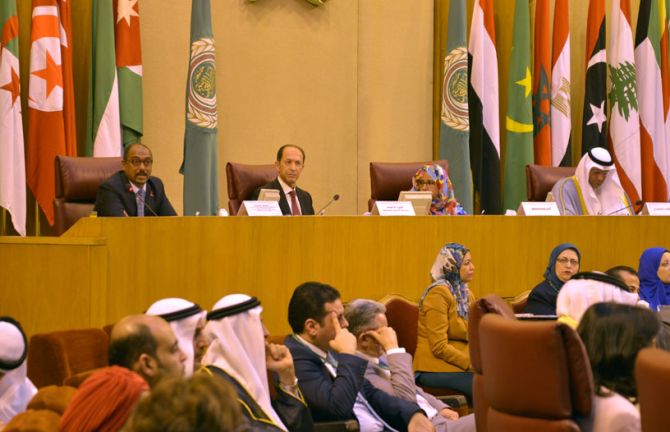
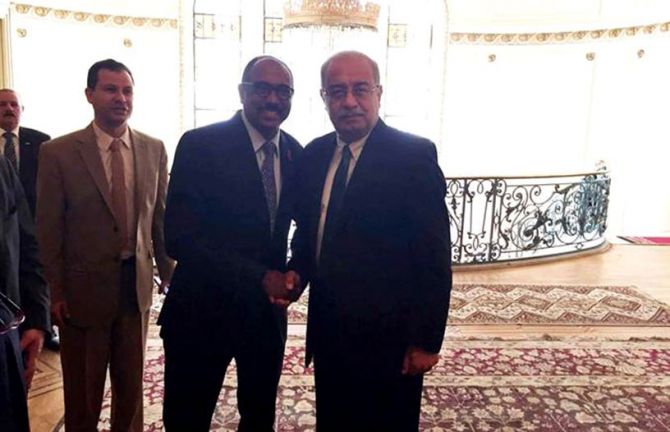
Update
Arab countries reaffirm their commitment to end the AIDS epidemic
07 March 2016
07 March 2016 07 March 2016The Council of Arab Ministers of Health has unanimously endorsed a resolution that urges countries to accelerate their efforts for the implementation of the Arab AIDS Strategy and to Fast-Track national responses to end AIDS by 2030.
Speaking at the council meeting, held in Cairo, Egypt, on 3 March, UNAIDS Executive Director Michel Sidibé commended the leadership the council and ministers have demonstrated in the AIDS response. He noted that the Arab AIDS Strategy (2014–2020) presents a unified position, is informed by evidence and considers regional specificities. He said that, in the context of the Sustainable Development Goals, there is an urgent need to reduce health inequities between countries by embracing global health security principles derived from values of social justice and inclusive societies for all.
Mr Sidibé also expressed hope that Oman, the United Arab Emirates and other Arab countries would soon be certified as having eliminated mother-to-child transmission of HIV. He urged countries that are on the verge of achieving this goal to finalize the validation process and become pioneers in the region.
The Deputy Secretary-General of the League of Arab States, Ahmed Benhelli, met with Mr Sidibé and pledged to mobilize support for the upcoming United Nations General Assembly High-Level Meeting on Ending AIDS, to be held in June in New York, United States of America. In bilateral meetings with the Ministers of Health of Bahrain, Djibouti and Libya, Mr Sidibé highlighted the importance of high-level participation by Arab countries and their effective contribution to a strong political declaration.
The significant and catalytic leadership role Egypt has in the region was raised by Mr Sidibé in a meeting with the Egyptian Prime Minister, the Assistant Minister of Foreign Affairs, the Minister of Health and the Minister of Social Solidarity. He emphasized that Egypt is forging strong partnerships in Africa, especially in the local production of medicines, which is essential to ensure and sustain universal health coverage in the Middle East and Africa.
During his visit to Egypt, Mr Sidibé was introduced to Yousra, a renowned actress and singer who was recently appointed as a UNAIDS Regional Goodwill Ambassador for the Middle East and North Africa. Through her advocacy, Yousra has shown the impact regional champions and celebrities can have in building bridges and reaching out to leaders to end AIDS in the region by 2030.
Quotes
“This region can be a hub of excellence and greater partnership for development in Africa. Its values of social justice and inclusive society can help significantly reduce inequality as a threat to global health security.”
“Through the strong, dynamic partnership with the UNAIDS regional support team, we have achieved great results in the last three years. The League of Arab States is committed to supporting the United Nations General Assembly High-Level Meeting on Ending AIDS and a strong political declaration to end AIDS by 2030.”
“Egypt strongly supports the mandates of UNAIDS and is keen to fulfil them in line with an evidence-based approach while using the best expertise, innovative thinking and the right advocacy messaging to reach global agreement in the AIDS response, including at the United Nations General Assembly High-Level Meeting on Ending AIDS.”
“Engaging civil society organizations and a very benevolent private sector in our work is extremely crucial in service provision. They can help us with awareness and sensitization, tolerance, fighting stigma and discrimination and scaling up social protection programmes.”
Region/country
Related
 Government ensures continuity of treatment in Malawi
Government ensures continuity of treatment in Malawi

10 February 2025

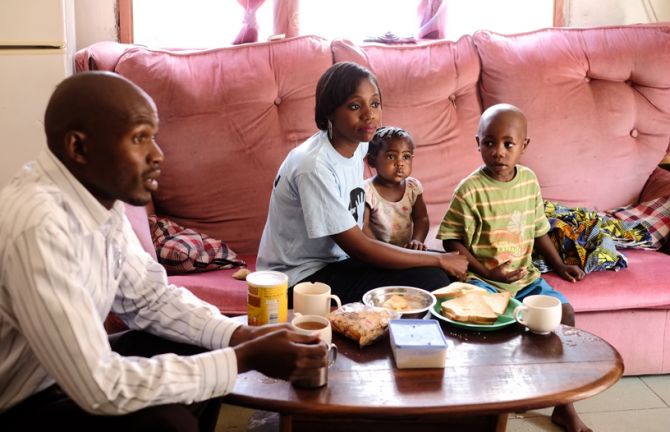
Update
Ensuring quality care at home for children affected by HIV
26 February 2016
26 February 2016 26 February 2016A strong, efficient and supported workforce in health-care facilities is essential for providing effective HIV services to people living with HIV. However, the needs of family carers, home-based carers and community carers are often overlooked. UNAIDS recently co-hosted a meeting with the Coalition for Children Affected by AIDS in collaboration with the United Nations Children's Fund to explore how to address the specialized needs of home carers caring for children affected by HIV.
Countries have made rapid progress in reducing mother-to-child transmission of HIV—new HIV infections among children globally declined by 58% between 2000 and 2014. However, globally only 32% of children living with HIV have access to antiretroviral therapy and without a strong family and support system children will be left behind.
The meeting aimed to address the important issues facing families and communities caring for children within a home setting and was driven by concern about the lack of age-appropriate, evidence-informed HIV policy, programming and implementation. It recognized the urgent need to empower parental figures and caregivers. The participants discussed their experiences and best practices to be shared with donors, implementers and activists in order to better support home caregivers.
The consultation was hosted in collaboration with the Partnership for Maternal and Child Health, and the Regional Inter-Agency Task Team on Children in Eastern and Southern Africa. It brought together nearly 60 experts in child health and development, including representatives of civil society, implementers, scientists, funders and activists.
Deputy Executive Director of UNAIDS Luiz Loures encouraged the participants to proactively engage in the United Nations General Assembly High-Level Meeting on Ending AIDS, which is to be held in New York, United States of America, from 8 to 10 June 2016.
Quotes
“In efforts to leave no child behind at any time in their lives, we must consider a life course approach—one that enables caregivers to support children from birth right through to adolescence and early adulthood.”
Related

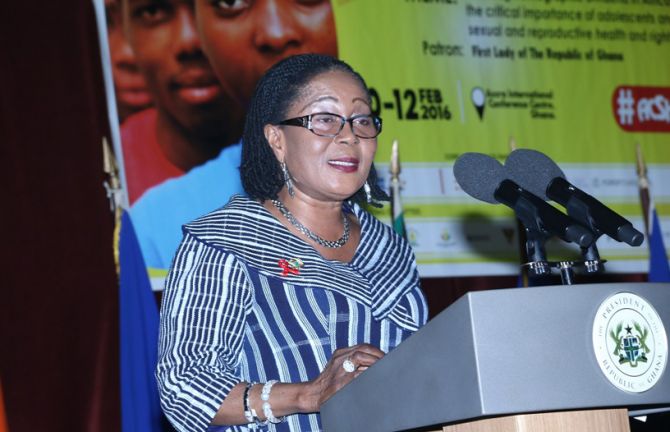
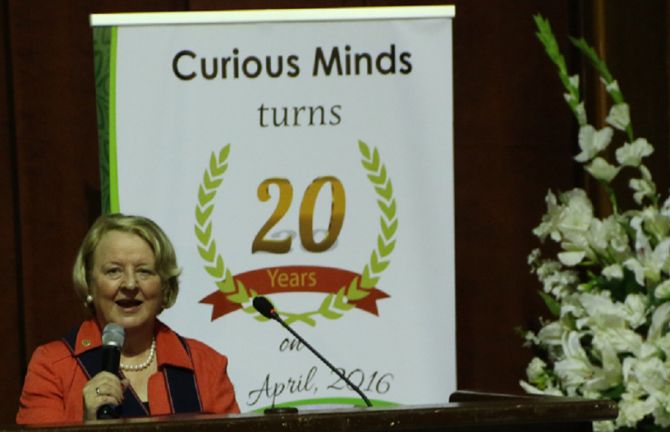

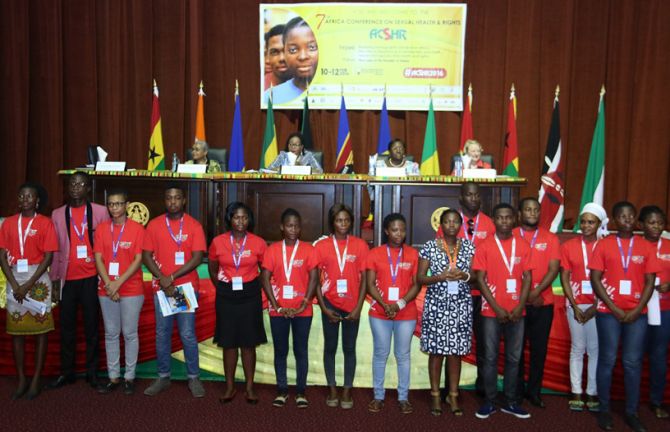
Update
Sexual health and rights and HIV integration critical to ending AIDS among young people
12 February 2016
12 February 2016 12 February 2016A powerful message about the need to progress on both the response to HIV and the sexual and reproductive rights of young people came out of the seventh Africa Conference on Sexual Health and Rights, which took place in Accra, Ghana, from 8 to 12 February.
The theme of the conference was “Realizing demographic dividend in Africa: the critical importance of adolescents and youth sexual and reproductive health and rights”. It was hosted by the First Lady of Ghana, Lordina Mahama, who is also the President of the Organisation of African First Ladies against HIV/AIDS (OAFLA), and brought together a broad range of stakeholders from government, the diplomatic community, youth groups, organizations of people living with HIV, the private sector, academia and the media.
The conference concluded that it was possible to end AIDS as a public health threat by 2030 only if the sexual and reproductive rights of young people were respected. The need for multisectoral investment in services for young people, including comprehensive sexuality education, was underlined.
Of the total number of adolescents living with HIV globally in 2014, 83% lived in sub-Saharan Africa. AIDS is now the leading cause of death among adolescents in Africa, and adolescents are the only age group in which AIDS-related deaths are not decreasing. In low- and middle-income countries, one in every three girls is married before reaching the age of 18, and one in nine is married before reaching their 15th birthday. Only a quarter of girls and a third of boys are reported to have a full understanding of how HIV is transmitted or how it can be prevented.
During the conference, Ms Mahama championed OAFLA’s launch of the continental All In campaign to end AIDS among adolescents. OAFLA also launched an initiative to end child marriage by 2020.
Quotes
“Enough is enough. Africa should no longer let its young people die from preventable diseases, nor allow young people to be immobilized by cultural practices that no longer have relevance. Achieving the 90–90–90 treatment target for HIV will help ensure no young person is left behind. As president of the Organisation of African First Ladies against HIV/AIDS and as a mother, I will rally the First Ladies around saving our adolescents from the effects of HIV. We will empower our young people to lead the drive—it is time to take the right action and make Africa a better place for the young.”
“The global community is daring to dream of a socially transformed world that is more equal, more peaceful, more sustainable. UNAIDS’ strategy recognizes the critical need to put youth, and particularly adolescent girls, at the heart of all efforts. Ensuring that young people can realize their sexual and reproductive health and rights is central to ending the AIDS epidemic. If we invest in girls and young women, boys and young men, and build coalitions across sectors, we can end AIDS by 2030.”
Region/country





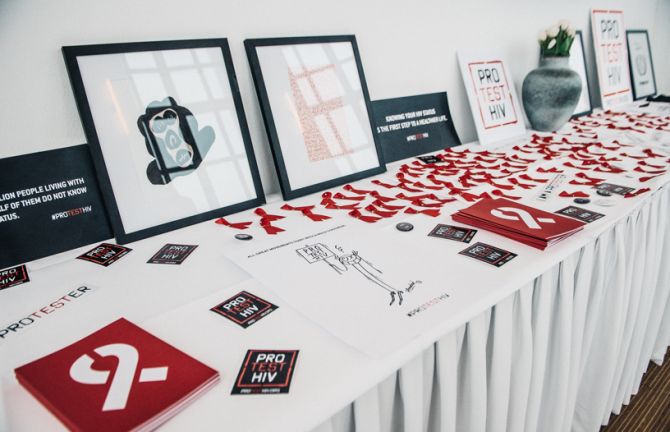
Update
ProTest HIV campaign launched in Berlin
15 February 2016
15 February 2016 15 February 2016On 15 February, on the margins of the 66th Berlin International Film Festival, UNAIDS launched the ProTest HIV campaign.
The event was held to raise HIV awareness among young people in Berlin and to engage them in the response to HIV through #ProTESTHIV and #GenEndit. It attracted young people from across Germany to engage with representatives of the German Government and the German AIDS organization AIDS Hilfe and with Kweku Mandela, AIDS activist and grandson of Nelson Mandela. The participants listened to the moving testimony of Bjorn Beck, the community representative of people living with HIV on the board of AIDS Hilfe, who not only inspired the audience but also reminded everyone why it is essential to keep younger generations engaged in the AIDS response.
The world has committed to ending the AIDS epidemic as a public health threat by 2030 as part of the Sustainable Development Goals. Almost 37 million people around the world were living with HIV in 2014—half of whom did not know that they are HIV-positive.
HIV testing is key to preventing and treating HIV. UNAIDS is working with young people to ensure they have the right information and access to HIV testing, prevention and treatment services. By raising awareness through the ProTest HIV campaign, UNAIDS is empowering young people take action and make informed decisions.
Quotes
“Our generation has never known a world without HIV. You have the power to change the world for the generations that will come after us.”
“UNAIDS has set global targets to achieve by 2020, including ensuring that 90% of people living with HIV know their HIV status. We need the support and engagement of young people to reach this global goal.”
“The biggest obstacle that people encounter on their way to getting tested is HIV-related stigma. People who know that they’ll be discriminated against—ostracized—when they are HIV-positive, they don’t want to get tested. If we want testing to be appealing, we must fight against discrimination.”
“Only an educated, respectful and accepting society, in which people living with HIV are integrated, can face the challenges of HIV successfully. We will fight the stigma, we will promote HIV testing and we will end the AIDS epidemic by 2030.”
Region/country

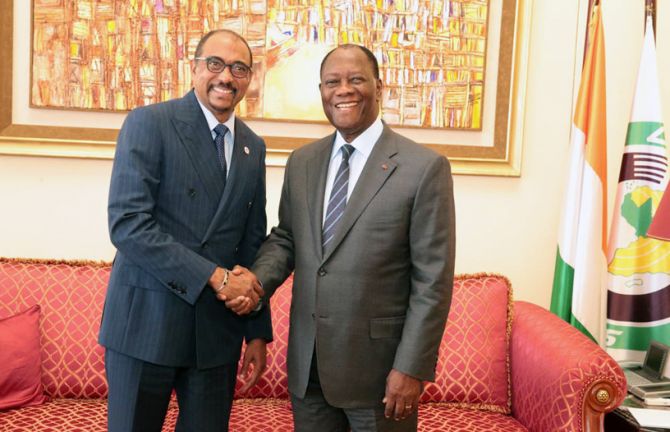
Update
President of Côte d'Ivoire pledges additional resources for the AIDS response
18 February 2016
18 February 2016 18 February 2016The President of Côte d'Ivoire, Alassane Ouattara, has promised additional funding for the AIDS response in the country in order to achieve the UNAIDS 90–90–90 treatment target by 2020.
Speaking during a visit by UNAIDS Executive Director Michel Sidibé, Mr Ouattara said all people living with HIV in Côte d'Ivoire must have access to antiretroviral medicines. As well as announcing further resources to reach this goal, Mr Ouattara stressed the importance of strengthening the pharmaceutical industry in western Africa to encourage the local production of medicines, especially for children.
During their meeting, the two leaders also underlined the importance of the United Nations General Assembly High-Level Meeting on Ending AIDS, which will take place in New York, United States of America, from 8 to 10 June.
Quotes
“We must progress more quickly on the question of treatment in Côte d'Ivoire to make sure that all those without access to antiretroviral medicines can get access. Sustainability in the AIDS response must become a reality and our country and the region as a whole has to become less dependent on external funding. We must also produce medicines locally.”
“With 80% of pregnant women living with HIV now receiving medicines to prevent the transmission of the virus to their children, Côte d'Ivoire can be on track to reach an AIDS-free generation.”
Region/country
Related

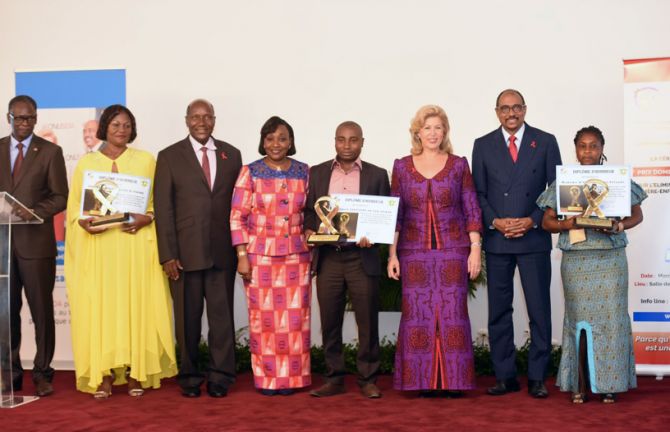

Update
Côte d’Ivoire’s First Lady celebrates service providers involved in the country’s AIDS response
18 February 2016
18 February 2016 18 February 2016At a ceremony in Abidjan, Côte d’Ivoire, attended by UNAIDS Executive Director Michel Sidibé, the First Lady of Côte d'Ivoire, Dominique Ouattara, has awarded the Dominique Ouattara Prize for Excellence to six service providers making a significant contribution to preventing mother-to-child transmission of HIV in the country.
In the category for the area providing excellence in service, the San Pedro district received first prize, with Grand Lahou coming second. In the category for top performing civil society organization, the Organisation des Femmes Actives de Côte d’Ivoire received first prize, while Femme Egale Vie came second. Amah Yolande and Louis Saba received prizes for the excellence of their work as community service volunteers.
Côte d’Ivoire has made rapid progress in reducing mother-to-child transmission of HIV by scaling up treatment coverage across the country. The proportion of pregnant women receiving antiretroviral medicines to prevent their children being born with the virus reached 80% at the end of 2014, up from around 50% at the end of 2012. The total number of new HIV infections in Côte d'Ivoire has fallen from around 52 000 in 2000 to 25 000 in 2014.
Ms Ouattarra is a Special Advocate for UNAIDS, helping to raise awareness for programmes aimed at preventing new HIV infections among children and advocating for women and children living with HIV to access antiretroviral therapy.
Quotes
“I carry my title as Special Advocate for UNAIDS with pride and so it was important for me to acknowledge the work already accomplished in the response to HIV, particularly among women and children. I hope these awards further encourage everyone working towards the noble aim of eliminating mother-to-child transmission of HIV.”
“Côte d’Ivoire can be one of the first countries in western Africa to eliminate mother-to-child transmission of HIV. Let these prizes, the first of their kind on the continent, further strengthen our commitment to an AIDS-free generation in Africa.”
Region/country
Related

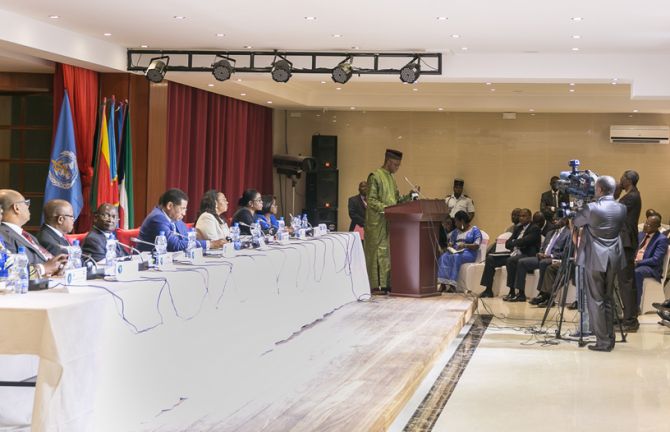
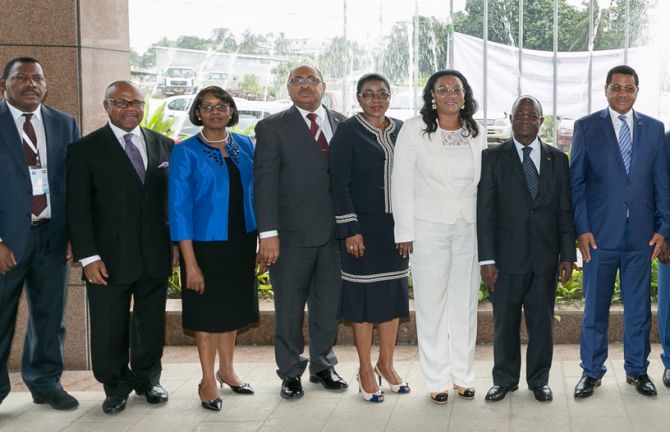
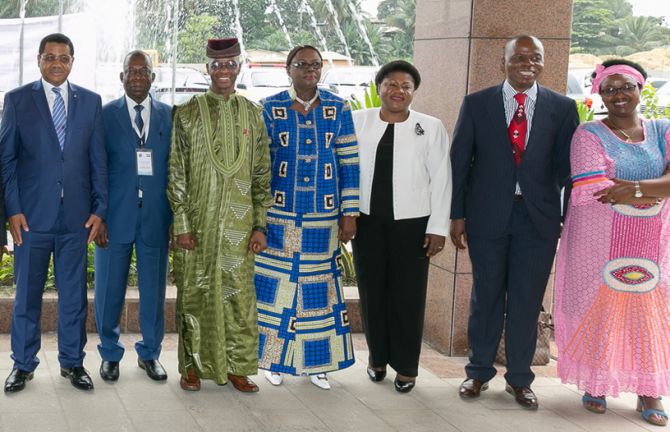
Update
Economic Community of Central African States creates a special fund for health to strengthen its response to AIDS
12 February 2016
12 February 2016 12 February 2016Meeting in Libreville, Gabon, on 12 February, the ministers of health of the Economic Community of Central African States launched an ambitious programme to strengthen regional cooperation by establishing a community health fund to reinforce the region’s AIDS response.
The ministers also decided to improve coordination by setting up a specialized unit to enhance cross-border HIV prevention strategies and by developing a regional mechanism to source antiretroviral medicines on a larger scale. They also adopted a plan to increase the proportion of pregnant women and children receiving antiretroviral medicines.
The measures are designed to encourage countries to better share their experiences, allowing for a more efficient implementation of recommendations made during a meeting of HIV experts in Dakar, Senegal, in December 2015.
Quotes
“UNAIDS and its partners will actively contribute to this programme by ensuring that the lessons learned in the AIDS response can be used for monitoring and responding to other epidemics.”
Region/country

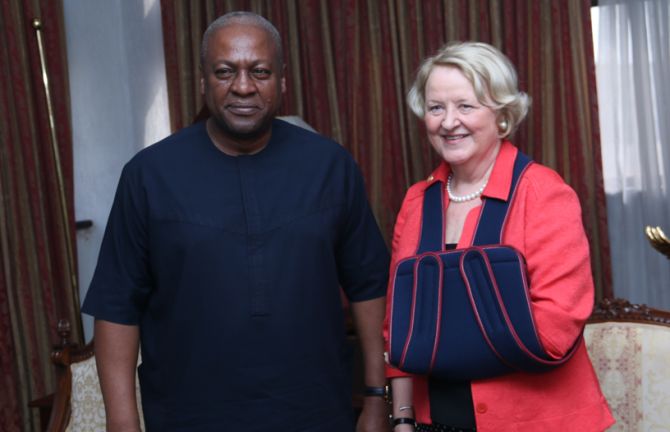
Update
Advancing efforts to make the end of AIDS a reality in Ghana
15 February 2016
15 February 2016 15 February 2016As Ghana starts its term as the newly elected Vice-Chair of the UNAIDS Programme Coordinating Board (PCB) for 2016, the President, John Dramani Mahama, underlined how increased advocacy, partnership and investment in the AIDS response will bring results that go beyond health. Such efforts will also improve broader gender, rights and development outcomes across the sustainable development agenda.
President Mahama said during discussions with visiting UNAIDS Deputy Executive Director Jan Beagle that complacency needs to be addressed by expanding evidence-informed and rights-based initiatives, programmes and services. Scaling up capacity for local production of antiretroviral therapy is one way.
Ghana has made significant strides in its AIDS response through integrated multisectoral HIV responses that provide lessons learned for western Africa. Ghana reduced new HIV infections by 53% between 2001 and 2014 and AIDS-related deaths by 45% in the same period. According to 2008 and 2014 demographic and health surveys, HIV testing among women almost doubled between 2008 and 2014.
While in Ghana, Ms Beagle met with key stakeholders from government, civil society and international partners to prepare the country’s Vice-Chairmanship of the PCB and its role at the UN General Assembly High-Level Meeting on Ending AIDS.
Welcoming Ghana’s new role within the PCB, Ms Beagle commended the country’s comprehensive and cross-sectoral approach, which has shown particular collaboration across government sectors of health, education, gender, culture and justice. She noted the importance of continued focus on addressing social drivers of HIV in Ghana and the broader western Africa region, underlining the need for particular populations at highest risk, including, critically, adolescent girls.
Minister of Health Alexander Segbefia underlined that by focusing the response in locations and among populations where HIV risk and vulnerability is highest, Ghana will be able to build on the gains made, sustain momentum and move towards an AIDS-free generation.
Quotes
“This is not the time to let our guard down. This is the time we should be stepping up our responses to get to the end of AIDS. We are honoured to be appointed as Vice-Chair of the Programme Coordinating Board and we will play our role very effectively with UNAIDS—our strong partner in achieving success.”
“Ghana’s cross-governmental approach is impressive and is driving change. As Vice-Chair Ghana will bring experience and energy to the Programme Coordinating Board. We are looking forward to Ghana’s support for a strong political declaration at the High-Level Meeting on Ending AIDS, to help us make the end of AIDS a reality.”
“As Ghana takes the position as Vice-Chair of the Programme Coordinating Board, we will certainly work hard to justify the confidence reposed in us. We are committed to working closely with UNAIDS to achieve our collective goal of making our world AIDS-free by 2030.”
Region/country
Related
 Impact of US funding cuts on HIV programmes in Ghana
Impact of US funding cuts on HIV programmes in Ghana

08 April 2025

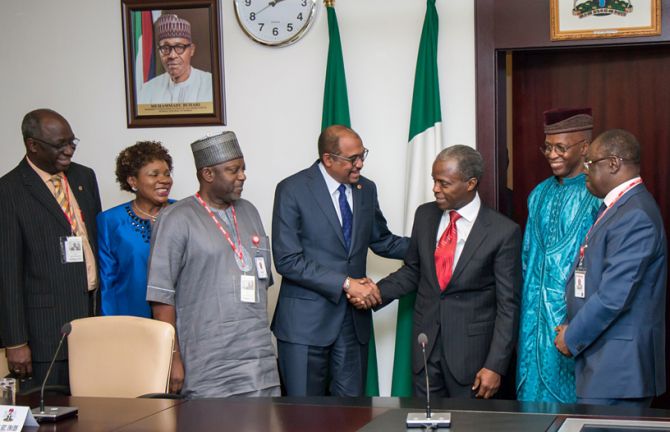
Update
Investing in the AIDS response in Nigeria
10 February 2016
10 February 2016 10 February 2016UNAIDS Executive Director Michel Sidibé hailed Nigeria for having halted the spread and reversed the trend of its AIDS epidemic during a visit to the country from 7 to 10 February. He also urged the political leadership to increase domestic funding for the response from 22% in 2012 to 45% by 2020.
During his visit, Mr Sidibé met with the Vice-President of Nigeria, Yemi Osinbajo, and urged the government to increase its support for the Maternal, Neonatal and Child Health Week, with the aim that all pregnant women are tested for HIV by the end of 2016 and all women who test HIV-positive have immediate access to antiretroviral therapy. The health week has proven to be an excellent opportunity for pregnant women to know their HIV status. During the health week in 2015, for example, Kaduna State reported testing 84 000 pregnant women for HIV in a first round and an additional 126 000 in a second round.
Mr Osinbajo told Mr Sidibé during the meeting that Nigeria was making huge budget allocations for social investment programmes, in part to increase access to health care and help end the AIDS epidemic.
Nigeria was invited to participate in the United Nations General Assembly High-Level Meeting on Ending AIDS, scheduled for 8 to 10 June, and to play a leading role in the development and adoption of its political declaration.
Nigeria has the second largest HIV epidemic in the world, with 3.4 million people living with HIV in the country in 2014. However, with increased investment in the AIDS response from Nigeria and its partners, the situation has improved in the past decade. New HIV infections dropped from 310 000 in 2004 to 230 000 in 2014, and coverage of antiretroviral therapy increased from 13% in 2011 to 22% in 2014, providing more than 747 000 people living with HIV with access to life-saving medicine.
During his visit, Mr Sidibé also met with the Secretary to the Government of the Federation, the Minister of Budget and National Planning, the Minister of Finance, the Minister of Health, the Minister of Environment, development partners, the Dangote Foundation; pharmaceutical companies and civil society; as well as the UNAIDS Champion and former President of Nigeria, Olusegun Obasanjo.
Quotes
“The government is determined to make sure that everyone has access to universal health care in Nigeria. We are also very determined to work towards ending new HIV infections.”
“Putting our people on treatment is important to the realization of zero new infections. If we are going to sustain treatment, we will need to have a plan for the transition from externally funded treatment to treatment offered with domestic funds. Nigeria has the means to make this happen.”






